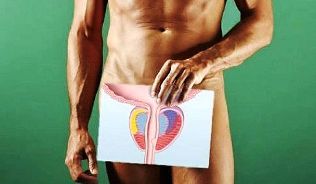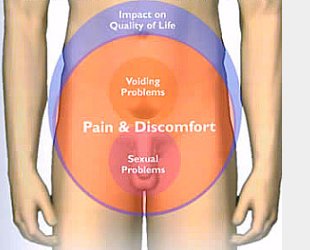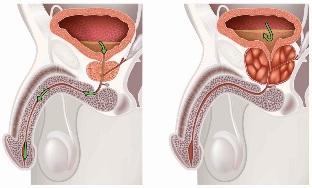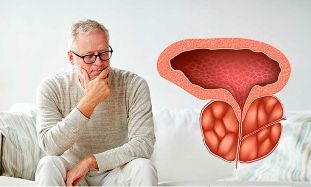Chronic prostatitis is a prolonged inflammation of the prostate, which leads to damage of the morphology and functioning of the prostate gland. Chronic prostatitis is manifested prostatic triad of pain in the pelvic region and genital area, urinary disorders, sexual disorders. The diagnosis of chronic prostatitis includes palpation of the gland, study of prostate secretion, ultrasonography, uroflowmetry, in, a needle biopsy of the prostate. In chronic prostatitis shows complex medical, physiotherapy, massage prostate, instillation posterior urethra. Surgical treatment is recommended in complicated forms of chronic prostatitis.
Chronic prostatitis

Chronic prostatitis is a common male disease: approximately 50% of men suffer from some kind of inflammation of the prostate gland. Chronic prostatitis often affects men aged 20 to 40 years, in the period of maximum sexual and reproductive activity. In this regard, detection and treatment of chronic prostatitis in urology is becoming not only medical, but also social aspect.
Classification of chronic prostatitis
According to the contemporary classification of prostatitis developed in 1995, we can distinguish between 3 categories of the disease:
- I. Acute prostatitis.
- II. Chronic prostatitis of bacterial origin.
- III. Chronic nonbacterial prostatitis Genesis/chronic pelvic pain Syndrome – a syndrome which is not associated with obvious signs of infection and continued 3 months or more.
- III chronic prostatitis with an inflammatory component (detection of prostate secretion white blood cells and infectious agents);
- III B chronic prostatitis without inflammatory component (leukocytes and pathogens in the prostate secretion).
- IV. Asymptomatic chronic prostatitis (no complaints in the identification of leukocytes in prostatic secret).
In the presence of the infectious component speaks for bacterial (infection) chronic prostatitis; in the absence of microbial pathogens – nonbacterial (non-contagione) prostatitis. It is believed that 90-95% of all cases there is non-bacterial chronic prostatitis, and only 10-5% is bacterial.
The causes of chronic prostatitis

The etiology and pathogenesis of chronic bacterial prostatitis are associated with any infection of the prostate following ways: upwards (through the urethra), down (when the reflux of infected urine from the bladder), hematogenous (blood highways) or lymphogenous (for lymphatic collectors). Most uropathogens are E. coli, Klebsiella, Proteus, Staphylococcus, Enterococcus, CORINE, fungal, parasitic and viral pathogens. Together with the non-specific flora the development of chronic prostatitis can take part agents specific urethritis (chlamydia, Mycoplasma, gonococcus, Trichomonas, Gardnerella).
However, for the development of chronic prostatitis it is not so much the presence and activity of micro-organisms as the state of the pelvic organs and circulation in them, the presence of comorbidities, the level of protective mechanisms.
Therefore, the occurrence of chronic prostatitis can contribute to a number of factors. First of all, it urological diseases, pyelonephritis, cystitis, urethritis, stricture of the urethra, increatos to the end of the acute prostatitis, orchitis, epididymitis etc. Microbial etiologist can get into the prostate from distant foci of infection, for example, sinusitis, tonsillitis, dental caries, chronic bronchitis, pneumonia, pyoderma, etc. A predisposition to chronic inflammation, local and General hypothermia, overheating, stay in a moist environment, fatigue, malnutrition, rare urination, etc.
Chronic non-bacterial prostatitis is typically associated with congestive (congestive) phenomena in the prostate caused by stasis of venous circulation in the pelvic organs and impaired drainage acini of the prostate. Local obstructio causes an overflow of blood vessels of the prostate with blood, swelling of incomplete emptying of secretions, the breach of the barrier, secretory, motor, contractile function of the gland.
Congestive changes generally are caused by behavioral factors, long-term sexual deprivation, the practice, interrupted or prolonged sexual activity, excessive sexual activity, lack of exercise, prolonged sitting, chronic intoxication (alcohol, nicotine, drugs), occupational hazards (vibration). For the development of nonbacterial chronic prostatitis predisposing pathology of the organs in the pelvis and the nerve structures of their innervation (eg. spinal cord injury), adenoma of the prostate, hemorrhoids, constipation, androgenodeficiency, etc. reasons.
Symptoms of chronic prostatitis
Chronic prostatitis is manifested by local and General symptoms. Local manifestations belongs prostatic triad, which is characterized by pain, dysuria and sexual dysfunction. The pain in chronic prostatitis are of the constant pain in nature, localized in the perineum, genitals, suprapubic, groin. Pain syndrome increases at the beginning and at the end of urination, with pain radiating to the glans penis, the scrotum, sacrum, the rectum. The pain may increase after sexual intercourse or in connection with long-term abstinence; to weaken or strengthen after orgasm to become more intense in the moment of ejaculation.
The intensity of the pain syndrome of chronic prostatitis varies from discomfort to expressions that violate the sleep and performance events. Pain with a restricted localization in the sacrum is often considered as a low back pain or sciatica, in conjunction with the patient long treated without the doctor's help.

Urination in chronic prostatitis and painful learning. While there may be difficulties in the beginning miscet, a weakening or discontinuity of the flow of urine, feeling of incomplete emptying of the bladder, frequent nighttime urination, burning in urethra. In the urine in the chronic prostatitis can detect the presence of the existing topics. After a bowel movement or physical exertion of a little appear in the distribution , as a result of the lowering of the tone of the prostate. In chronic prostatitis can cause itching, a feeling of cold or excessive sweating in the crotch, the local change of the color of the skin, associated with the stagnation of the circulation of the blood.
Chronic prostatitis accompanied by severe disorders of sexual function. Phenomena gipotenzia may be worsening, painful erection, long and frequent nocturnal erections, weight or early ejaculation, loss of libido (reduced libido), deleted orgasms Hematospermias, infertility. Sexual dysfunction is always hard, experienced man, which leads to psycho-emotional disorders, to neurosis and depression, and even more to be aggravated and sexual function.
Exacerbation of chronic prostatitis accompanied by a slight increase in body temperature and deterioration of health. Overall condition in chronic prostatitis is characterized by increased irritability, lethargy, anxiety, fatigue, loss of appetite, disturbance of sleep, decreased work capacity, creative and physical activity.
Almost one-quarter of patients with chronic prostatitis symptoms for a long time absent, resulting in late treatment of the urologist. Long duration of chronic prostatitis can be complicated by impotence, vesiculitis, epididymoorchitis, male infertility, incontinence, stone formation, cysts of the prostate gland, sclerosis of the prostate, development of adenoma and cancer of the prostate.
The diagnosis of chronic prostatitis
Necessary for the diagnosis of chronic prostatitis information obtained through a comprehensive laboratory and instrumental examination. Initial screening for suspected chronic prostatitis include the clarification of anamnesis and complaints, conducting an external inspection of the genitalia for discharge, lesions, irritations, digital rectal examination of the prostate, with the aim of determining the shape, boundaries, consistency, sensitivity of the breast.
To determine the structural and functional changes of the prostate is shown holding ultrasound of the prostate (TRUS). Important methods in the diagnosis of chronic prostatitis is the study of the secret prostate, urinalysis, bacteriological examination of the test from the urethra and urine, 3 cups of urine samples, PCR and RIDGE study scraping of pathogens of genital infections, the determination of prostate-specific antigen (PSA).
Clinically significant chronic prostatitis is a detection in the analysis of the causative agents of chlamydiosis, mycoplasmosis, herpes, cytomegalovirus, trichomoniasis, gonorrhea, candidiasis, and nonspecific bacterial flora. The fence prostate secretion of the studies carried out after the wetting and massage of the prostate. Symptoms of chronic prostatitis are increasing the number of cells in field of view, reducing the number of lecithin granules, the presence of pathogenic microorganisms.
In General urine analysis in chronic prostatitis may show pyuria, pyuria, erythrocyturia. Bacteriology urine culture helps to identify the extent and nature of bacteriuria. With reproductive disorders, shows a study of the sperm and the MARCH test.
The extent and the causes of voiding help to determine the urodynamic studies (uroflowmetry, cystometry, profilometry, electromyography). With the use of data from studies of chronic prostatitis can be differentiated from stress incontinence, neurogenic bladder, etc. When the hematuria, Hematospermias, obstructive voiding of the endoscopic examination urethroscopy, and cystoscopy. To eliminate the adenoma and prostate cancer requires the determination of the PSA, in some cases, a biopsy of the prostate with the morphological study of tissues.

Treatment of chronic prostatitis
Chronic prostatitis cure difficult, but remember that the recovery is still possible and largely depends on the mood of the patient, the timeliness of his appeal to the specialist for the monitoring of all the requirements of the urologist. The mainstay of the treatment of chronic bacterial prostatitis antimicrobial therapy is in accordance with antibiotics at least 2 weeks. To reduce pain and inflammation Nsaids are appointed ; to relax the muscles of the prostate, the restoration of urodynamics and outflow prostatic secretion shows reception a-adrenoblokatorov.
With the aim of improving drainage of the prostate, local microcirculation and increased muscle tone are held throughout the therapeutic massage of the prostate. Massage of the prostate should result in the allocation of not less than 4 drops of the prostate secretion. Prostate massage is contraindicated in acute bacterial prostatitis, abscess of the prostate, hemorrhoids, stones, prostate, rectal fissures, hyperplasia of prostate and prostate cancer.
For the relief of the pain syndrome chronic prostatitis can be recommended paraprostatic the blockage, acupuncture. Important in the treatment of chronic prostatitis play a physiotherapy appointment of medicinal electrophoresis, ultrasound, phonophoresis, magnetic therapy, laser magneticam illic, inductometer, mud therapy, SMT, hot hip bath at a temperature of 40 – 45°C, enemas with hydrogen sulfide and mineral waters, instillation into the urethra.
With the development of complications associated with chronic prostatitis surgical treatment: the removal of strictures of the urethra; TUR of the prostate or prostatectomy when the sclerosis of the prostate; transurethral resection of the bladder with multiple sclerosis, neck, puncture and drainage of cysts and abscesses of the prostate; circumcisio with phimosis caused by recurrent infections of the urinary tract, etc.
Prevention of chronic prostatitis
Prevention of chronic prostatitis requires compliance with genital hygiene, timely treatment of urogenital and extragenital infections, the normalization of the regularity of sexual life, sufficient physical activity, prevent constipation, timely emptying of the bladder.
To avoid recurrences of chronic prostatitis necessary dynamic checks andrologist (urologist); preventive courses of physiotherapy, multivitamins, immunomodulators, with the exception of hypothermia, overheating, stress, bad habits.


























